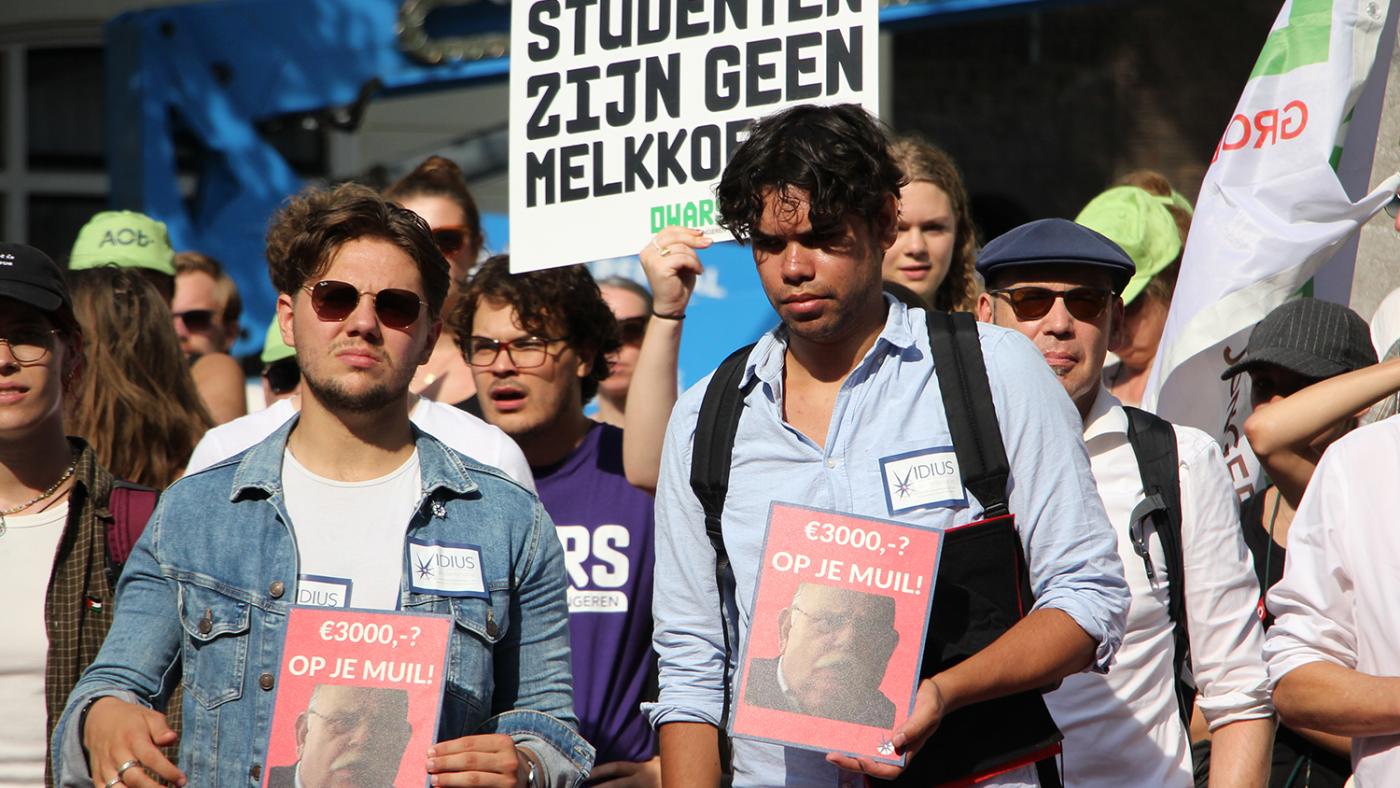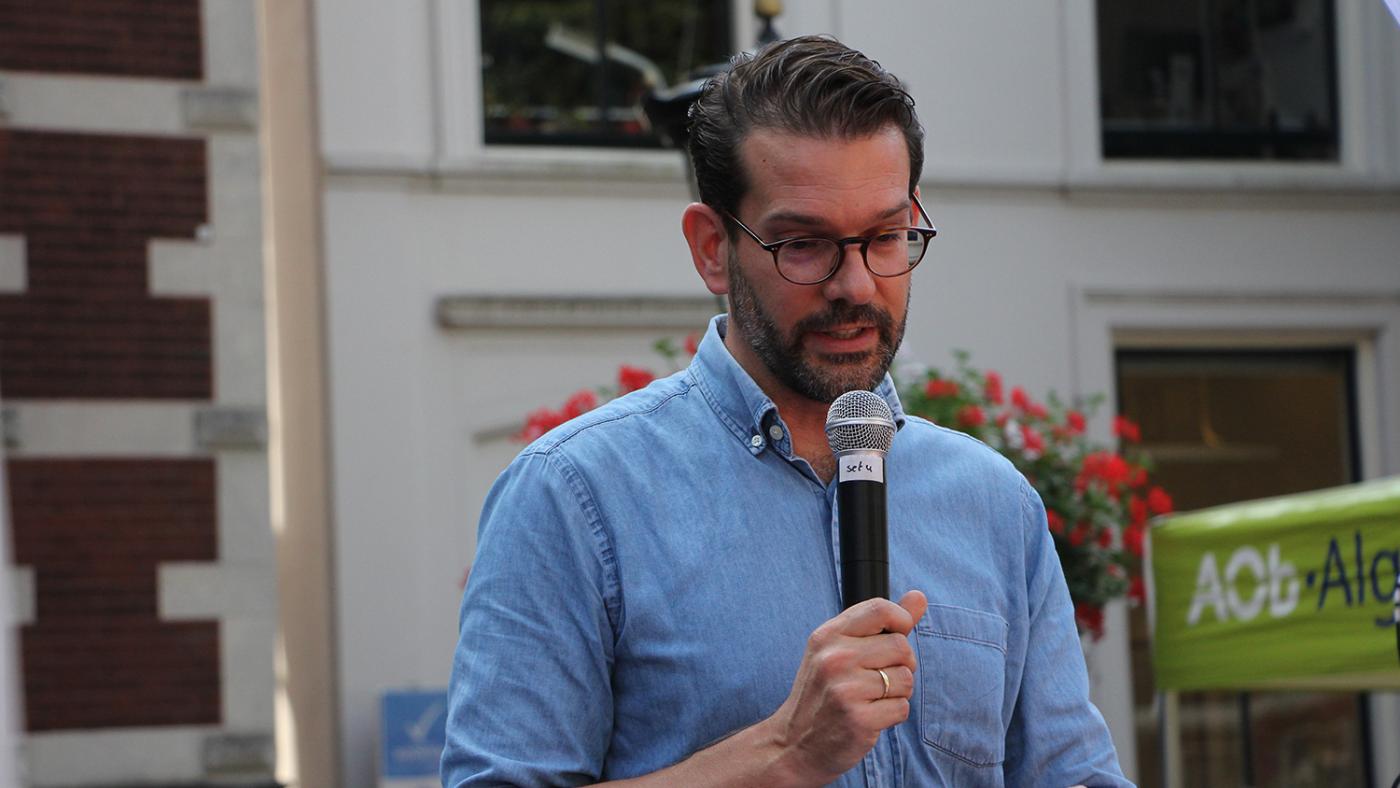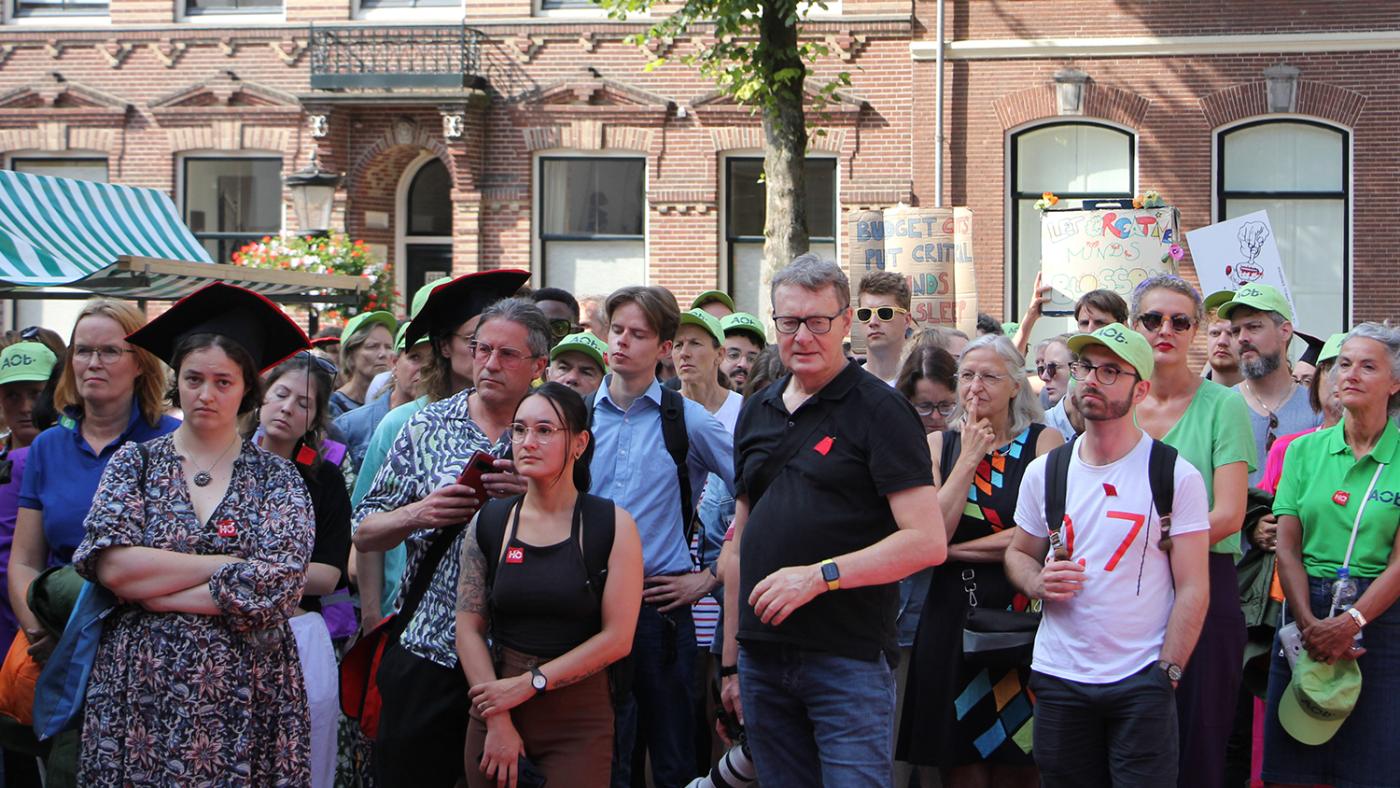Calling for a general strike
Alternative Opening of the Academic Year protests forthcoming budget cuts

Between 150 and 200 protesters gathered at Dom Square on Monday for the Alternative Opening of the Academic Year. The event, which has existed for about a decade, was conceived by the education trade union AOb and protests abuses in the higher education sector. In recent years, it has focused on excessive workloads and the abundance of teachers on temporary contracts. This time, the event targeted the substantial budget cuts announced by the new government.
Eleven organisations participated in the alternative opening, including big trade unions, the protest group WOinActie, the Young Academy, student unions and groups representing PhD candidates and postdocs. This time, the associations representing universities and universities of applied sciences were there as well for a five-minute presentation.
The cuts will amount to 1 billion euros a year, almost as much as Utrecht University costs. Universities of the Netherlands (UNL), the representative of research universities, is even considering legal action against the budget cuts, as UU Vice-President Margot van de Starre had already stated in July. Van der Starre was present at the Alternative Opening of the Academic Year alongside her colleagues on the UU Executive Board, Rector Henk Kummeling and President Anton Pijpers.

A huge red square was placed in front of the stage. That's a symbol used by activists worldwide when denouncing problems in academia. The speakers, who all wrote their speeches and chose what to focus on, are worried about the significant budget cuts to higher education and research announced by the cabinet.
One of the ways the new cabinet intends to save money in higher education is by scrapping the so-called stimulus grants, to which some 1,200 young researchers owe their jobs. The coalition's intention to restrict the influx of foreign students is another thorn in the universities' side. A representative of researchers in training said that more than 50 percent of PhD candidates in the Netherlands come from abroad. If they would all leave after obtaining their PhDs, the country would suffer from a "brain drain". But international researchers are not the only ones who would look for better opportunities abroad, Dutch researchers would also be more inclined to work elsewhere if employers had fewer vacancies to offer.
Postdocs complained about the excessive workload and the abundance of temporary contracts, two problems that would only worsen with the planned budget cuts. That's a complaint AOb thought would be a thing of the past, following the new deals in the Collective Labour Agreement (CAO) and the additional funds the previous minister of education had earmarked for research.
The National Student Union (LSVb), which also spoke on behalf of the National Student Association (ISO), mainly focused on the fine the new cabinet aims to introduce for students who take longer to graduate than the standard duration of their programmes. The two student organisations think that the fine – 3,000 euros for each additional year – targets students who are already having a hard time. Besides, LSVb chair Abdelkader Karbache argued that such a fine would make higher education degrees a privilege for the elite again. "No wonder these plans were not mentioned by any party programme. They are simply too ridiculous to write down."
Maurice Limmen, chair of the association of universities of applied sciences, also criticised the fine harshly. According to him, just announcing the fine is already damaging. He claimed to have spoken with first-year students who decided to follow a two-year programme instead of a four-year one because of the fine.

UNL chair Caspar van den Berg
Mild words
The only one who had mild words for the cabinet – after some fundamental critiques, of course – was Caspar van den Berg, chair of the association of Dutch universities (UNL). According to him, the cabinet wants to have a competitive economy, good health care and a resilient society, "all matters for which highly educated young people and scientific research are essential."
In addition to chairing UNL, Van den Berg is a senator affiliated with VVD, one of the parties in the new cabinet. He helped VVD write its election programme. In his view, the budget cuts would be "a disaster", so much so he is considering taking legal action against them. However, his own party is co-responsible for them and he will soon have to vote on the subject in the Senate.
Asked whether he could oppose the cuts in a personal capacity but still support his party, Van den Berg said: "No, I wouldn't do that. These are plans that still need to be worked out. It's not a black-and-white situation yet, nothing is set in stone. Therefore, I will take any opportunity to try and limit the damage." He noted that the budget cuts would eliminate at least 5,000 jobs.
Some of the speakers were from Utrecht University, such as Willemien Sanders, from WOinActie, and Markha Valenta, from Casual Utrecht. The protest movement 0.7 was there too. 0.7 gave the floor to a pro-Palestine activist from Utrecht Encampment, who argued that university administrators are silencing students and have capitulated to the far-right.

Strike, strike
Everyone agreed that the cutbacks must be scrapped. But how to make it happen? UNL mentioned legal action, while Professor Rens Bod, from the University of Amsterdam, and WOinActie both argued that going on strike would be a good idea, albeit as a last resort. Bod told the audience that strikes helped to force a U-turn on budget cuts in Scotland a few years ago. Scottish students and lecturers went on strike at the end of the academic year, supported by university administrators. This way, no one would be able to graduate. The government eventually gave in. Bod thinks the same should happen in the Netherlands. As far as he is concerned, a general strike involving students, lecturers, researchers, executive board members and unions would cause enough disruption. “Strike! Strike!” the crowd chanted.
Two international lecturers from Leiden University were at the protest, carrying big cardboard signs. One came to the Netherlands four years ago and has a Dutch partner, while the other has been living here for eight years. They both work at the Faculty of Arts. “I live here, so I also get involved with political matters. Since I can’t make myself heard in the voting booth, I come to meetings like this.”
The unions have already announced the next protest. It's going to happen on November 14 (page in Dutch, Ed.).One will have to wait until Budget Day (September 17) to find out what this protest will look like.
The absence of the Minister of Education, Eppo Bruins, was felt. He was in Rotterdam visiting Albeda, a vocational education institution, as well as the Rotterdam University of Applied Sciences and Erasmus University. After the protest, several administrators rushed over there.